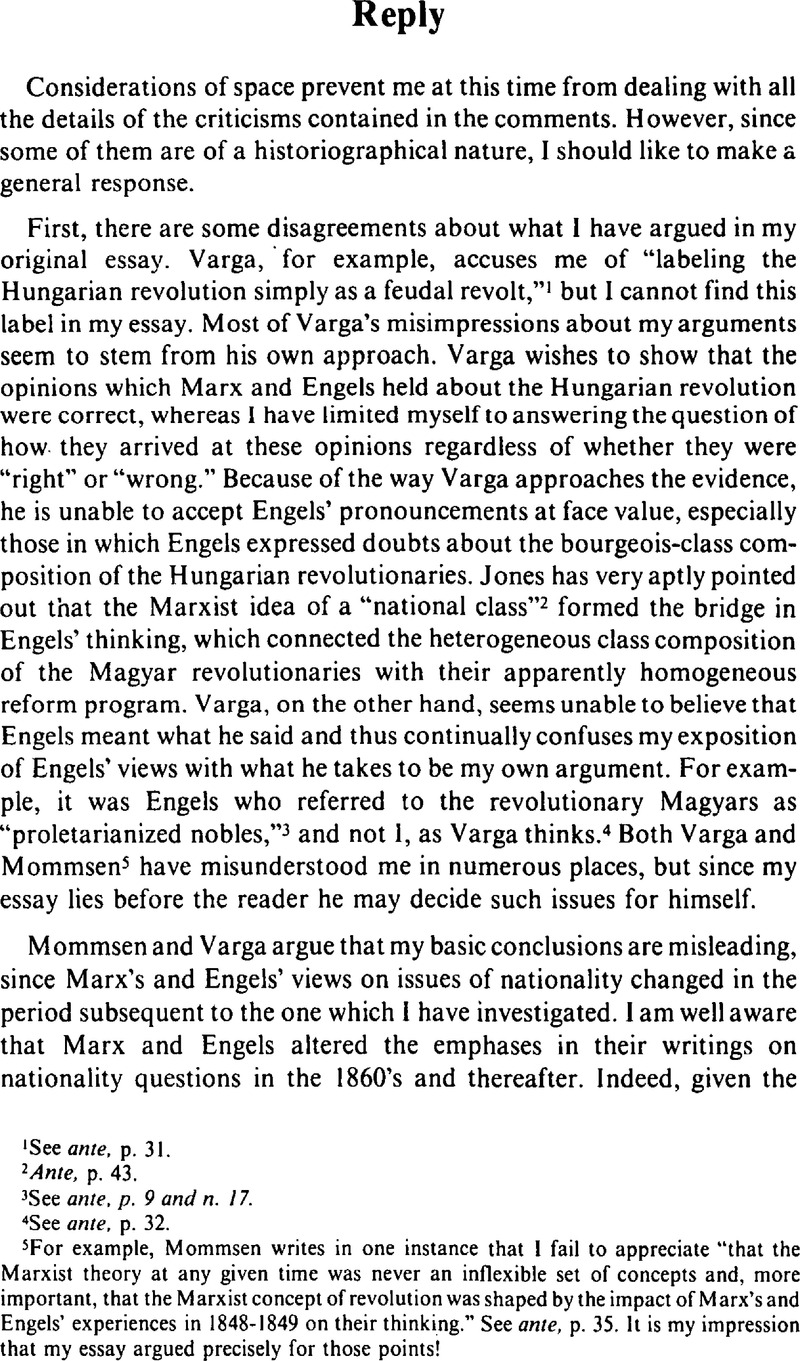No CrossRef data available.
Article contents
Abstract

- Type
- Reply
- Information
- Copyright
- Copyright © Center for Austrian Studies, University of Minnesota 1973
References
1 See ante, p. 31.
2 Ante, p. 43.
3 See ante, p. 9 and n. 17.
4 See ante, p. 32.
5 For example, Mommsen writes in one instance that I fail to appreciate “that the Marxist theory at any given time was never an inflexible set of concepts and, more important, that the Marxist concept of revolution was shaped by the impact of Marx's and Engels' experiences in 1848–1849 on their thinking.” See ante, p. 35. It is my impression that my essay argued precisely for those points!
6 See ante, p. 41.
7 See ante, p. 40.
8 See Karl, Marx and Friedrich, Engels, “Die deutsche Meologie,” Gesamlausgabe (18 vols., Glashütten: Verlag Detlev Auvermann KG, 1970), Pt. 1, Vol. V, p. 18.Google Scholar In this brief exposition of the materialist dialectic, I am limiting myself to citations from The German Ideology (1846) in order to demonstrate that Marx and Engels had a clearly materialist philosophy long before turning to nationality questions in detail.
9 See ibid., pp. 17–22.
10 This is all clearly outlined in the section entitled “Über die Produktion des Bewusstseins,” ibid., pp. 26–39.
11 For a discussion of this aspect of historical determinism, see Adolf, Grünbaum, “Free Will and Laws of Human Behavior,” L'Age de la Science, Vol. II (1969), pp. 109–110.Google Scholar
12 See ante, p. 38.
13 Their opposition to Hegel's system was already fully formulated in the“Ökonomischphilosophische Manuskripte” (1844), especially in the section entitled “Kritik der Hegelschen Dialektik und Philosophie überhaupt.” Moreover, Marx's and Engels' philosophy was not a natural further development of Hegel's, as Mommsen seems to think, but rather a conscious break with Hegel. Marx explicitly testifies in the preface to “Zur Kritik der politische Ökonomie” (1859) that he and Engels had set out in the spring of 1845 “to work out in common the opposition of our view to the ideological view of German philosophy, in fact to settle accounts with our former philosophical conscience. This intention was realized in the form of a critique of post-Hegelian philosophy.” Quoted in Marx and Engels, Gesamtausgabe, Pt. 1, Vol. V, p. xi. The italics are mine.
14 See ante, p. 37.
15 Marx, and Engels, , Gesamlausgabe, Vol. VI, p. 529. The italics are mine.Google Scholar
16 Ibid., p. 530.
17 Ibid., p. 535. The italics are mine.
18 “The conditions of existence [Lebensbedingungen] of the old society are already destroyed within those of the proletariat.…Modern industrial labor, modern subjection to capital, the same in England as in France, in America as in Germany, has stripped [the proletariat] of every trace of national character.” Ibid., p. 536. See also the quotation from Marx by Jones, ante, pp. 44–45.
19 See ante, p. 36. The italics are mine.
20 One could only arrive at an interpretation like Mommsen's if one saw the monarchy, as Hegel might, as necessarily and inextricably bound up with the territories of the empire in the “idea” of the state. However, Engels was at this time no longer a Hegelian and did not endorse the Habsburg monarchy, as may be seen in the numerous quotations to the contrary given throughout my original essay.
21 See ante, p. 36.
22 See ante, p. 38.
23 See ante, p. 31.
24 See ante, p. 36.
25 Ibid.
26 Mommsen may still wish to insist that there were “subconscious” similarities between Marx and Engels, on one hand, and Hegel, on the other. But how useful is it to stress any such “similarities?” The historical antecedents of the two philosophies were different, the philosophical systems themselves were different, and certainly the historical consequėnces were different. I insist that these kinds of differences constitute an important historical difference between Marx and Hegel, regardless of any speculative psychological “similarities!”
27 This is true even in the occasional instance when a traditional criterion of nationality was applied ad hoc to a specific group. See, for example, my discussion of Engels' application of the criterion of national history to the South Slavs. Ante, p. 14.
28 See Ante, p. 5.
29 Ante, p. 40. Varga mistakenly thinks I have argued that Marx and Engels “were influenced by a pro-Hungarian bias.” See ante, p. 32. On the contrary, I maintain that the early Marxist writings on nationality cannot be explained by an appeal to any bias whatever, without arbitrarily limiting the evidence. Compare with Jones' statement (see ante, p. 43).
30 See ante, p. 41.
31 The Czech case, in which Marx and Engels changed their judgments very radically, is, of course, the greatest anomaly in any static approach to the thought of Marx and Engels at this time. Neither Varga (see ante, p. 31) nor M ommsen (see ante, p. 36) is able to give an account of the reasons for these changes in judgment.


